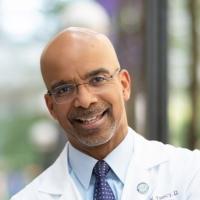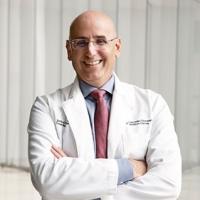Dr. J. Thomas Bigger Lecture Series
Offered in partnership with Department of Medicine Grand Rounds
Learn more about the Dr. J. Thomas Bigger Lecture Series.
8th Annual Lecture, "Interconnected Intelligence: AI's Role in Reshaping 21st Century Digital Infrastructure"
Kenneth D. Mandl, MD, MPH
- December 6, 2023
Dr. Ken Mandl directs the Computational Health Informatics Program at Boston Children's Hospital and is the Donald A.B. Lindberg Professor of Pediatrics and Biomedical Informatics at Harvard Medical School. He is trained as a pediatrician and pediatric emergency physician.
Dr. Mandl is a member of the National Academy of Medicine and as part of its Leadership Consortium, co-chairs its Digital Health Action Collaborative. His work at the intersection of population and individual health has greatly influenced the burgeoning field of biomedical informatics. He pioneered real-time biosurveillance and championed patient involvement in data production and access, leading to the creation of the first personal health and participatory surveillance systems. Dr. Mandl's advancements in 'SMART' programming interfaces, in conjunction with his influence on the 21st Century Cures Act, have streamlined universal access to individual and population health data. These capabilities enhance interoperability in healthcare systems and foster substantial economies of scale.
Dr. Mandl has been elected to the American Society for Clinical Investigation, Society for Pediatric Research, American College of Medical Informatics and American Pediatric Society. He is a recipient of the Presidential Early Career Award for Scientists and Engineers, the Donald A.B. Lindberg Award for Innovation in Informatics and the Clifford A. Barger Award for top mentors at Harvard Medical School. He was advisor to two Directors of the U.S. CDC and chaired the Board of Scientific Counselors of the NIH’s National Library of Medicine.

7th Annual Lecture, "Driving Equity in Translational Research: Learning from Patients and Communities"
Speaker: Katrina Armstrong, MD
- September 21, 2022
Katrina Armstrong, MD, leads Columbia University’s medical campus as the Chief Executive Officer of CUIMC, which includes the Vagelos College of Physicians and Surgeons (VP&S), the School of Nursing, the College of Dental Medicine, and the Mailman School of Public Health. She also is Executive Vice President for Health and Biomedical Sciences for Columbia University and Dean of the Faculties of Health Sciences and the Vagelos College of Physicians and Surgeons. As VP&S dean, Dr. Armstrong leads the nation’s second oldest medical school and the first to award an MD degree. Trained as an epidemiologist, she is an internationally recognized investigator in health disparities, quality of care, and cancer prevention and outcomes, an award-winning teacher, and a practicing general internist. She has served on multiple advisory panels for academic and federal organizations and has been elected to the National Academy of Medicine, the American Academy of Arts and Sciences, the Association of American Physicians, and the American Society for Clinical Investigation. Before joining Columbia, Dr. Armstrong was the Jackson Professor of Clinical Medicine at Harvard Medical School, Chair of the Department of Medicine and Physician-in-Chief of Massachusetts General Hospital, and Professor of Epidemiology at the Harvard T.H. Chan School of Public Health. Before joining Harvard, she was Chief of the Division of General Internal Medicine, Associate Director of the Abramson Cancer Center, and Co-Director of the Robert Wood Johnson Clinical Scholars Program at the University of Pennsylvania. She is a graduate of Yale University (BA degree in architecture), Johns Hopkins (MD degree), and the University of Pennsylvania (MS degree in clinical epidemiology). She completed her residency training in internal medicine at Johns Hopkins.

6th Annual Lecture, “The Treatment of Heart Failure; Anticipating a New Era”
Speaker: Clyde W. Yancy, MD, MSc
- September 22, 2021
Clyde W. Yancy, MD, MSc is Vice-Dean of Diversity & Inclusion, Northwestern University, Feinberg School of Medicine. He concomitantly serves as Chief of Cardiology at Northwestern University, Feinberg School of Medicine, and Associate Director of the Bluhm Cardiovascular Institute at Northwestern Memorial Hospital. He holds the Magerstadt Endowed Professor of Medicine Chair and also holds an appointment as Professor of Medical Social Sciences.
Dr. Yancy is a native of Louisiana and earned a B.S. degree, (4.0, Honors), from Southern University; and an M.D. degree, (Alpha Omega Alpha), from Tulane University School of Medicine in New Orleans. He completed an internship and residency in internal medicine at Parkland Memorial Hospital in Dallas. He completed his fellowship in cardiology at the University of Texas Southwestern Medical Center at Dallas where he received research training in the Human Physiology Laboratories of Blomqvist and Mitchell and advanced heart failure and heart transplant training from Maria T. Olivari (1990). He received his initial faculty appointment in 1989 and held a position on the faculty at UT Southwestern Medical Center for 17 years where he ascended to the rank of Professor of Medicine. Concurrently he was holder of the Carl Westcott Distinguished Chair in Medical Research, Associate Dean for Clinical Affairs and Medical Director of the Heart Failure/Heart Transplant Program. In 2006 he was named Director of the Baylor Heart and Vascular Institute, Dallas. In 2010, he completed a Master’s of Science in Medical Management (Beta Gamma Sigma) at the University of Texas- Dallas, School of Business and Management.
Dr. Yancy’s research interests are heart failure, clinical guideline generation, outcomes sciences, personalized medicine, and health care disparities. He is extensively published with well over 600 peer‑reviewed publications, an H-index of > 100 and annual recognition as one of the most highly cited scientific authors worldwide. Dr. Yancy is Deputy Editor, JAMA Cardiology, and Senior Section Editor (Heart Failure), Journal of the American College of Cardiology (JACC). He serves on the editorial boards for Circulation, Circulation Heart Failure, the American Heart Journal, and JACC Heart Failure.
Dr. Yancy is board certified in internal medicine with a subspecialty in cardiovascular disease. He is a Master of the American College of Cardiology (ACC), a Master of the American College of Physicians, a Fellow of the American Heart Association (AHA), and a Fellow of the Heart Failure Society of America. He has served on innumerable clinical practice guidelines and consensus statements writing committees and served as Chair, ACC/AHA Heart Failure Clinical Practice Guideline Writing Committee, 2011 - 2020. He served as co-chair of the ACC Diversity & Inclusion Taskforce, 2016 2020. Dr. Yancy is a former president of the AHA (2009–2010) and recipient of the Gold Heart Award (2014) and the James Herrick Medal (2020) for distinguished achievement in clinical cardiovascular medicine. He has completed extensive Government service for the National Institutes of Health, (incl. service on the Advisory Committee to the Director for the NIH), the Food and Drug Administration, (incl. Chair of the Cardiovascular Device Panel), and the Patient‑Centered Outcomes Research Institute (as a founding member of the Methodology Committee).
In 2016, Dr. Yancy was elected to the National Academy of Medicine. In 2018, he was appointed to the Minority Health Affairs Subcommittee, Department of Health and Human Services. Also in 2018, Dr. Yancy received two lifetime achievement awards for clinical research from WomenHeart® and for research and leadership in Diversity from the Cardiovascular Research Foundation®. In 2019, he received the Outstanding Alumnus Award from his alma mater, Tulane University School of Medicine, New Orleans, Louisiana. In 2020, he was elected to membership in the Association of American Physicians (AAP). In 2021, he was named an Honorary Fellow, American Society of Preventive Cardiology.

5th Annual Lecture, "At the Intersection of Brain and Heart: Beyond Atrial Fibrillation"
Speaker: Mitchell S. V. Elkind, MD, MS, FAAN, FAHA
- October 21, 2020
Dr. Mitchell Elkind is a tenured Professor of Neurology and Epidemiology at Columbia University, Chief of the Division of Neurology Clinical Outcomes Research and Population Sciences (Neuro CORPS) in the Neurology Department, and Director of Irving Institute Hub Liaison Team to Trial Innovations Network (TIN). Dr. Elkind is also the newly appointed President of the American Heart Association, for 2020-2021.
Dr. Elkind received his medical degree from Harvard Medical School, and trained in Internal Medicine at Brigham and Women’s Hospital and in Neurology at Massachusetts General Hospital, both in Boston, MA. He completed a fellowship in Vascular Neurology and Neuroepidemiology at Columbia University Medical Center under the mentorship of Dr. Ralph Sacco. Dr. Elkind holds a Master’s degree in Epidemiology from Columbia’s Mailman School of Public Health.
Dr Elkind’s research focuses on stroke prevention, inflammatory and infectious biomarkers in stroke risk prediction, atrial cardiopathy, immune therapy for acute stroke, and vascular causes of cognitive aging. Dr. Elkind is the Principal Investigator of several independent investigator awards from NIH/NINDS, including the ARCADIA trial of apixaban vs aspirin for atrial cardiopathy in cryptogenic stroke; the Northern Manhattan Study (NOMAS), an epidemiological study of stroke risk factors; the Neuroprotection with Statin Therapy for Acute Recovery Trial (NeuSTART), a clinical trial evaluating short-term high-dose statin therapy in acute stroke; and the Levels of Inflammatory Markers in Treatment of Stroke (LIMITS) study.
Dr. Elkind also has a longstanding commitment to medical education and research training. In addition to leading the Columbia Neurology residency and fellowship programs, he serves as editor of the AHA/ASA Stroke journal’s new International Stroke Early Career and Training Section (InterSECT). He runs NIH-funded research training programs for residents and fellows. Dr. Elkind has served on several AHA/ASA committees, including 3 terms on the National Board of Directors (2014-2020), 2 terms as Chair of the ASA Advisory Committee (2016-2020), and co-chair or member of several writing committees for guidelines and scientific statements. He co-chaired the writing committee for the 2012 scientific statement on the inclusion of stroke as an outcome and risk equivalent in vascular disease risk scores, and currently serves as chair of the stroke section of the annual statistical update.

4th Annual Lecture, "Technological Advances in Heart Failure"
Speaker: Nir Uriel, MD, MSc, FACC
- November 20, 2019
Dr. Nir Uriel, Professor of Medicine, Director of NYP Heart Failure, Heart Transplant & Mechanical Circulatory Support Programs, Columbia University Irving Medical Center, Weill Cornell Medicine.
Dr. Nir Uriel was born and grew up in Israel. He earned his Bachelor of Science and medical degrees at the Ben Gurion University of the Negev. He completed his internship in internal medicine at Assaf Harofeh Medical Center, followed by four years as a physician in the Israeli Defense Force, attaining the rank of Major. He returned to Assaf Harofeh Medical Center to complete his residency and a cardiology fellowship, followed by a year on the medical staff. In 2008, Dr. Uriel began fellowships in cardiology, heart failure and transplant, and mechanical circulatory support at Columbia University. In 2013, he added a master's degree in biostatistics and was named "teacher of the year" by the Columbia University cardiology fellows. One year later, he was recruited to the University of Chicago where he helped to build their heart failure program and, over the past 5 years, led them to become a top heart failure institution in the nation.
Dr. Uriel is considered an international leader in clinical care for patients with heart failure and/or those who require transplantation as well as an expert in the use and management of Left Ventricular Assist Devices (LVADs) and other mechanical circulatory support systems. Dr. Uriel returned to Columbia University Irving Medical Center and NewYork-Presbyterian Hospital in August 2019, to direct the NYP Heart Failure, Heart Transplant & Mechanical Circulatory Support Programs.

3rd Annual Lecture, "Genomic Medicine, What Can We Realistically Expect"
Speaker: Hugh Watkins, FRS, FMedSci, MD, PhD
- October 31, 2018
Dr. Hugh Watkins is Radcliffe Professor of Medicine and the Head of the Radcliffe Department of Medicine at the University of Oxford, a large multidisciplinary department with research interests that span the translational spectrum, from basic biological research through to clinical application. The department has internationally renowned programmes in a broad range of sciences related to medicine, ranging from cardiovascular, diabetes, endocrinology, and stroke research, to molecular medicine, immunology, haematology and pathology, including programmes in stem cell & regenerative medicine.
Through his own research Professor Watkins has made a series of contributions to the understanding of the genetic basis of inherited cardiac diseases, and has used these advances to pioneer new approaches to diagnosis and therapy with substantial impact on human health. His work on hypertrophic cardiomyopathy, the most common and clinically important Mendelian cardiac disorder, provided a paradigm for the field and has changed practice worldwide. HCM is a major clinical problem as it affects 1 in 500 of the population and is the commonest cause of sudden death in young adults. Building on the discovery that this previously ‘idiopathic’ heart muscle disorder is caused by mutations in diverse myofilament proteins he recognised the potential impact this could have and went on to develop direct genetic testing and to show its clinical utility for identifying individuals at risk. Genetic testing is now considered the first line approach for managing families affected by this disorder, with a Class I indication in European guidelines. In functional studies his group demonstrated that the mutant myofilament proteins increase calcium-sensitivity and the energy cost of force production. These findings highlighted novel aspects of muscle physiology and cardiac energetics, opening the way to new approaches to therapy which are now undergoing clinical trial. Through this work, and his role as lead of Oxford’s Genomic Medicine theme, he has particular experience in large-scale clinical use of whole genome sequencing.
Professor Watkins also leads an established programme investigating susceptibility genes for coronary artery disease, including chairing a large European consortium in this area and contributing to the leadership, as a member of the executive, of the international CARDIOGRAMplusC4D Consortium. His group has contributed to the identification of a significant proportion of the known common susceptibility variants for coronary artery disease (for example the recent CARDIOGRAMplusC4D GWAS meta-analysis based on 1000genomes imputation, providing definitive resources for future functional evaluation, was led from Oxford). Important findings specifically from his group in Oxford include evidence that lipoprotein Lp(a) levels are causally related to coronary disease risk.
He is a Fellow of the Royal Society and a Fellow of the Academy of Medical Sciences in the UK, a NIHR Senior Investigator, a member Scientific Advisory Committee of the Fondation Leducq and has completed a term as an Associate Editor of Circulation Research. Honours have included the Paul Dudley White Lecture of the American Heart Association in 2011.

2nd Annual Lecture, "Beyond QT: Assessing Pro-Arrhythmia Potential"
Speaker: Daniel M. Bloomfield, MD, MPhil, FACC, FAHA
- March 8, 2017
Dr. Daniel M. Bloomfield is Senior Vice President, Global Clinical Development at Merck Research Laboratories, and is the Therapeutic Area Head for Cardiometabolic and Women’s Health Programs. In this role he currently leads a team responsible for a number of major programs including Januvia (sitagliptin), Zetia/Vytorin (ezetimibe), ertugliflozin (SGLT2 inhibitor – collaboration with Pfizer), anacetrapib (CETP inhibitor), a number of Women’s Health Programs in contraception and fertility, as well as programs in collaboration with Bayer AG focused on soluble guanylate cyclase activators Adempas (riociguat) approved to treat pulmonary hypertension and vericiguat being studied in patients with congestive heart failure. In addition to leading this therapeutic area, Dr. Bloomfield is responsible for the central coordination and strategic oversight of Merck’s R&D organization in China across all therapeutic areas.
Dr. Bloomfield joined Merck Research Laboratories in 2003 and to date has enjoyed a diverse career that has included discovery, as well as early and late clinical development. In 2011, he was chosen to chair the Early Development Research Committee which governs all programs in early development, was appointed Head of Global Project Management, and subsequently spent one year on assignment as Chief of Staff to the CEO Kenneth C. Frazier.
In addition to his executive duties, Dr. Bloomfield created the first Cardiac Organ Specific Safety Board at Merck, and was a founding member and co-chair of the Cardiac Safety Research Consortium (a public private partnership with the FDA, academia and industry) an organization devoted to advancing scientific knowledge on cardiac safety for new and existing medical products by building a collaborative environment based upon the principles of the FDA’s Critical Path Initiative, as well as other public health priorities. Dr. Bloomfield has also served as Rapporteur for the ICH E14 implementation working group.
After finishing a BA in Chemistry at Haverford College, Dr. Bloomfield took a Master's degree in Social Anthropology at the University of Oxford as a Rhodes Scholar. Upon his return to the US, he attended Harvard Medical School and subsequently did his Internal Medicine and Cardiology training at Columbia before joining the faculty upon graduation.
As an Associate Professor of Medicine in the Division of Cardiology, his academic research was supported by grants from the NIH (K08, R01, K24), multiple foundations, and industry. He became recognized internationally as an expert in syncope (fainting spells), as well as novel methods used to identify patients at risk for sudden cardiac death. In addition to his work as part of the Columbia Clinical Trials Unit, Dr. Bloomfield’s clinical laboratory was also involved in studies related to T wave alternans, the autonomic modulation of cardiac repolarization as well as characterizing U wave behavior in diverse autonomic states.
Dan has created and been involved in a number of charitable organizations. In 1986 he created the American-South African Scholarship Association which provides university scholarships for disadvantaged students in South Africa, and went on to become the Founding President of the Friends of Mandela Rhodes Foundation (USA). Dan was also a Founding Member of the Board for SEED Impact, an organization that provides a catalyst for high performance and sustainability in not-for-profit organizations. Additionally, Dan is a Board Member of the New Jersey Center for Performing Arts, serves on its Executive Committee, and Chairs the Arts Education Committee.
![daniel bloomfield]()
Inaugural Dr. J. Thomas Bigger Lecture, "Out of Sight, Out of Mind. Device–Detected Atrial Fibrillation"
Speaker: A. John Camm, MD
- January 27, 2016
Dr. A. John Camm, Professor of Clinical Cardiology, St. George’s University of London, Professor of Cardiology, Imperial University, London.
Dr. Camm was the 1965 Exhibitioner at Guy's Hospital Medical School, London (England). After qualifying in 1971 he worked at Guy's Hospital for three years and then spent a year in the U.S.A. (Burlington, Vermont) before working at St. Bartholomew's Hospital, London. He spent 12 years there, first as a Junior, then as a Wellcome Senior Lecturer and finally as the Sir Ronald Bodley Scott Professor of Cardiovascular Medicine. In 1986 Professor Camm moved to St. George's Hospital Medical School in London as the Prudential Professor of Clinical Cardiology, founded and supported by the British Heart Foundation. Professor Camm was elected the Chairman of Medicine in October 1990, a post rotated from in 1995. He was the Chairman of the Division of Cardiac and Vascular Sciences at St. George’s University of London until 2009.
Professor Camm has a broad range of professional interests. His major speciality is cardiac arrhythmias but he is also much involved in clinical cardiac electrophysiology, cardiac pacemakers, risk stratification in post myocardial infarction, heart failure and cardiomyopathy patients. He has a major interest in cardiovascular safety of cardiac and non-cardiac drugs. Professor Camm has given over 2000 lectures to national and international audiences, written more than 1400 peer review papers and over 350 detailed reviews. He has authored (5) and edited (30) books including the only British full sized textbook of cardiology (Diseases of the Heart), a major text on cardiac electrophysiology (Electrophysiological Disorders of the Heart – 2 editions) and the European Society of Cardiology Textbook on Cardiovascular Medicine – 2 editions).
Professor Camm is a Fellow of The Royal College of Physicians (London and Edinburgh) and also was elected (ad eundam) to the Fellowship of the Glasgow Royal College of Physicians and Surgeons. He a Fellow of the Academy of Medical Sciences, the American College of Cardiology, the American Heart Association, the Council of Geriatric Cardiology, the HeartRhythm Society (USA) and the European Society of Cardiology. He is also a member of the British Cardiovascular Society, the British Heart Rhythm Society and the European Heart Rhythm Association. Professor Camm is a past chairman of the European Working Group of Cardiac Arrhythmias (now the European Heart Rhythm Association), a past president of the British Pacing & Electrophysiology group (now, the British Heart Rhythm Society), past President of the British Cardiac Society (now British Cardiovascular Society) and a past Council Member of the Royal College of Physicians of London. He was formerly Convenor for the University of London.
Professor Camm is a former Member of the Board of Trustees of the North American Society of Pacing and Electrophysiology (now Heart Rhythm Society) and the British Cardiac Society, the Royal College of Physicians (London), the British Heart Foundation and the American College of Cardiology. He is a currently a Board Member and Trustee of the World Society or Arrhythmias - formerly the International Cardiac Pacing and Electrophysiology Society (ICPES). He was the Chairman of the Joint Cardiology Committee (Royal College of Physicians). He is currently a council member of the European Heart Rhythm Association.
Professor Camm is past member of the Supraventricular Arrhythmias Guidelines (AHA, ACC, ESC), Chairman of the Ventricular Arrhythmias and Sudden Cardiac Death Guidelines Group (AHA, ACC, ESC), and Chairman of the NICE Heart Failure Guideline Group, member of the NICE Atrial Fibrillation Guideline Group and Chairman of Acute Coronary Syndrome (NICE) Guidelines committee. He is the current Chair of the ESC Atrial Fibrillation Task Force and Guideline Committee, and a member of the European Society of Cardiology Ventricular Arrhythmia and Sudden Cardiac Death Guideline Taskforce.
Professor Camm has also devoted himself to assisting charities cardiology and especially cardiac arrhythmia charities. He is a regular spokesperson for the British Heart Foundation, a Patron of the Bart’s City Lifesaver Scheme, the Sudden Arrhythmia Death Syndrome charity, and is President of the Arrhythmia Alliance, the umbrella group for all UK charities concerned with cardiac rhythm disturbances. Professor Camm founded the Atrial Fibrillation Association and is currently a Trustee of this organisation. Professor Camm is a member of the Action for AF Group which lobbies the European Parliament and Commission with regard to atrial fibrillation related stroke. In addition Professor Camm regularly attends the meetings of several All Party Parliamentary Groups.
Professor Camm is Editor-in-Chief of Europace, the official journal of the European Heart Rhythm Society and Editor-in-Chief of Clinical Cardiology, a controlled circulation journal reaching 35,000 cardiologists, an editor of the European Heart Journal, and the founding editor of Cardiology in the Elderly. Until recently he was a senior editor of PACE and co-editor of JICE. He sits on the editorial boards of 15 other journals. Professor Camm is widely recognised for his research and teaching roles at national and international levels.
Professor Camm is a recipient of several honours including Queen’s Honorary Physician for his work in originally setting up and contributing to the medical protection of the Queen and the Royal Family over a period of 25 years, and Commander of the Venerable Order of St. John of Jerusalem for his contribution to teaching and service in the St. John Ambulance Brigade. Professor Camm has received several distinguished teaching awards for his effective and eloquent teaching of cardiology and related medical issues at both national and international forums.In 2005 Professor Camm is the recipient of the European Society of Cardiology Gold Medal which is awarded ‘to scientists who have made an outstanding contribution to the discipline of cardiology over the course of their career, through ground-breaking research in the pathophysiology of cardiovascular disease, or in the diagnosis, management and treatment of cardiovascular disease’. In 2008 the British Cardiovascular Society presented Professor Camm with the Mackenzie Medal.








